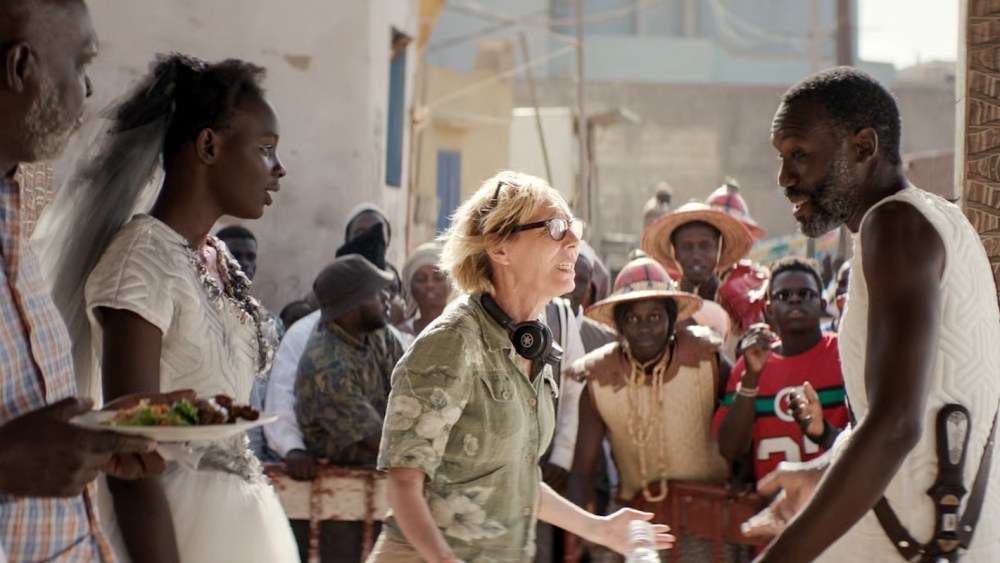A smart, withheld story about the borders between people, Ulrich Köhler’s self-reflexive “Gavagai” chronicles on-set tensions between the cast and crew of a filmed update of “Medea” and subtle fissures caused by a racist skirmish during its premiere. Its reinterpretation of Euripides’ play has its symbolic limits — intentional and otherwise — but it makes for an effective backdrop to the widely connected world of international art-house cinema and numerous ongoing debates on cultural optics. Rather than fighting this inevitable tide, Köhler closely examines the subject without didacticism, filtering it through a passive-aggressive relationship drama, until only its most potent ingredients remain.
An ambitious (and slightly dangerous) scene on a speedboat introduces us to a “Medea” set in some version of Senegal blending modernity and antiquity. The vengeful, eponymous matriarch, played by German actress Maja Tervooren (Maren Eggert), has killed her children and attempts to present their bloodied corpses to her husband Jason, embodied fiercely by French-Senegalese star Nourou Cissokho (Jean-Christophe Folly). The scene doesn’t go as planned, leading its irate French director Caroline Lescot (Nathalie Richard) to cause a slapstick ruckus, shot at a distance by Köhler’s camera.
Tempers fly as “Gavagai” pulls back to reveal behind-the-scenes chaos, including a hastily rewritten climax that irks the performers. Meanwhile, Cissokho’s father Mansour (Roch Peton), a respected Senegalese actor, is lumped in with hungry extras in the sweltering Dakar heat, but the solution to this conundrum involves gestural Band-Aids that neither fix not acknowledge the root issues, as Caroline redirects her grievances toward Maja, accusing her of being just another member of the bourgeoisie incapable of accessing the right emotions or experiences. All the while, the director insists on keeping uncomfortable life vests on the child actors, in service of superficial commentary on Europe’s migrant crisis.
“Gavagai” drips with irony from the word “go,” but Caroline (clearly modeled after Claire Denis) isn’t the movie’s focus. As the shoot winds down, Köhler observes Maja and Nourou engaging in flirtatious tête-à-têtes barely hidden from view. Seemingly mundane chats over dinner illuminate each dynamic in unexpected ways, though these dueling tensions — accusations of inauthenticity that span entire continents — remain unresolved when “Gavagai” skips forward to the characters’ star-studded Berlinale premiere.
In the cold and austere German winter (a far cry from Dakar’s physical and cultural warmth), an anxious Nourou acts up outside a hotel and is accosted by a Polish security guard, setting off a minor chain reaction in which Maja intervenes on his behalf, much to his chagrin. Each new development is underscored by a lingering discomfort about the racial dynamics of the skirmish and about Maja taking action where Nourou might have wanted to leave the whole thing be. Few characters directly address the incident, but its effects linger through the evening.
The subsequent uncertainty and introspection are exacerbated during a pre-festival press conference, which becomes a flashpoint when the cast and crew come under fire for an allegedly careless adaptation. Here, Köhler avoids the temptation to make caricatures out of either the fiery journalists or the defensive cast and crew. In the process, he highlights the numerous pitfalls in remixing old work for the modern world, with its numerous, clashing racial contexts. For instance, Caroline thoughtlessly cites James Baldwin as her North Star for making “Medea” a story of a white woman living as a minority among Africans in order to comment on oppression, an inversion that draws stunned responses. It’s hilariously awkward, but Köhler pulls off a remarkable balancing act by tethering his lens to the director and her naive sincerity.
If “Gavagai” has a major flaw, it’s that it returns too frequently to scenes of Caroline’s “Medea” to emphasize its point and to re-state the connections between the play and its own contemporary drama. However. Köhler’s unbroken visual remove allows his actors to let arguments grow and play out at length. In lieu of a musical score, their dramatic rhythms shape each scene, resulting in simmering tensions that emerge gradually and organically, as Nourou and Maja refuse to acknowledge the personal and professional grievances that prevent them from forging a lasting love. The result is deeply engaging.
The film’s title recalls the analytical philosophy of W.V. Quine, who posited a scenario where the word “gavagai” (in a made-up native language) could be interpreted in numerous ways. “Gavagai,” therefore, becomes a Tower of Babel story. Characters are seen occasionally translating phrases between French, English, German and Wolof — even the opening credits are presented in four languages — but in Köhler’s conception of the European film world, the folly of humanity isn’t different dialects, but rather, divergent frames of reference and lived experience based on ethnicity and nationality. These gridlocks prevent characters from effectively communicating how they hope to be seen. In the process, their humanity is rarely acknowledged on their own terms. The movie may be simple on its surface, but its conclusions verge on devastating.
